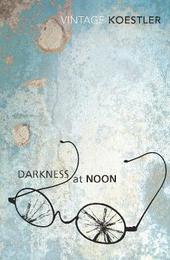
|
Darkness At Noon
Paperback / softback
Main Details
| Title |
Darkness At Noon
|
| Authors and Contributors |
By (author) Arthur Koestler
|
| Physical Properties |
| Format:Paperback / softback | | Pages:224 | | Dimensions(mm): Height 198,Width 129 |
|
| Category/Genre | Modern and contemporary fiction (post c 1945) |
|---|
| ISBN/Barcode |
9780099424918
|
| Classifications | Dewey:833.912 |
|---|
| Audience | |
|---|
|
Publishing Details |
| Publisher |
Vintage Publishing
|
| Imprint |
Vintage Classics
|
| Publication Date |
1 December 1994 |
| Publication Country |
United Kingdom
|
Description
'One of the few books written in this epoch which will survive it' New Statesman Darkness at Noon is set in an unnamed country ruled by a totalitarian government. Rubashov, once a powerful player in the regime, finds the tables turned on him when he is arrested and tried for treason. His reflections on his previous life and his experiences in prison form the heart of this moving and though-provoking masterpiece.
Author Biography
Arthur Koestler was born in Budapest in 1905. He attended the university of Vienna before working as a foreign correspondent in the Middle East, Berlin and Paris. For six years he was an active member of the Communist Party, and was captured by Franco in the Spanish Civil War. In 1940 he came to England. He wrote The Gladiators in Hungarian, Darkness at Noon in German, and Arrival and Departure in English. He set up the Arthur Koestler Award (now the Koestler Trust) which awards prizes for creative achievements to prisoners, detainees and patients in special hospitals. He died in 1983 by suicide, having frequently expressed a belief in the right to euthanasia.
ReviewsA remarkable book, a grimly fascinating interpretation of...all revolutionary dictatorships, and at the same time a tense and subtly intellectualised drama of prison psychology * Times Literary Supplement * [Darkness At Noon] is written from terrible experience. From knowledge of the men whose struggles of mind and body he describes. Apart from its sociological importance, it is written with a subtlety and an economy which class it as great literature. I have read it twice without feeling that I have learned more than half of what it has to offer me- Koestler approaches the problem of ends and means, of love and truth and social organisation, through the thoughts of an old Bolshevik, Rubashov, as he awaits death in a GPU prison * New Statesman * Along with Animal Farm and 1984, this book formed part of the essential bookshelf of those intellectuals who repudiated their early illusions about the Soviet Union -- Christopher Hitchens * The Week * It brilliantly portrays the chilling tyranny of Soviet Communism -- Sandy Gall * The Week * One of the few books written in this epoch which will survive it. * New Statesman *
|